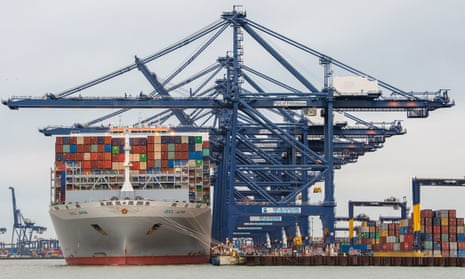Britain’s trade with the EU fell sharply in July, with Brexit and the global pandemic driving exports £1.7bn lower than in July 2018 and imports falling by £3bn, according to official data.
The Office for National Statistics (ONS) said the fall was largely driven by declines in medicinal and pharmaceutical products, which have been particularly hit by the need for separate regulatory approval post Brexit.
Experts said the latest ONS figures could be a sign that the UK is losing its overall competitiveness.
Compared with 2018, which the ONS describes as the most recent “stable” period in UK trade, the change in trading levels is stark.
In July, total exports of goods, excluding precious metals, fell by £300m because of a £900m (6.5%) fall in exports to the EU, the ONS said.
At the same time, exports to non-EU countries increased by £700m, not enough to compensate for the overall fall.
The British Chambers of Commerce’s head of trade policy, William Bain, said: “Overall, the figures remain concerning. Taken in conjunction with German trade data from earlier this week, the UK is clearly doing less trade with the EU than three years ago. SMEs and other businesses will want to see steps being taken by the UK government and the EU to help improve this situation in the coming months.”
Date issued by the German federal statistics office put the UK on course to fall out of the country’s top 10 trading partners for the first time in 70 years, with exports from the UK dropping 11% to €16.1bn (£13.8bn) in the first half of 2021.
“The UK’s loss of importance in foreign trade is the logical consequence of Brexit. These are probably lasting effects,” said Gabriel Felbermayr, the president of the Kiel-based Institute for the World Economy .
Ana Boata, the head of macroeconomic research at the trade credit insurer Euler Hermes, said: “UK exporters are losing their competitive advantage.”
She also cited the decline in financial services, which were not covered by the Brexit trade deal, as a contributing factor.
“Since its peak in 2017, financial services – the UK’s biggest exporting sector – has steadily lost its market share.
“The UK is the only one of the 10 biggest countries to see this happen, with Brexit exacerbating the decline.”
